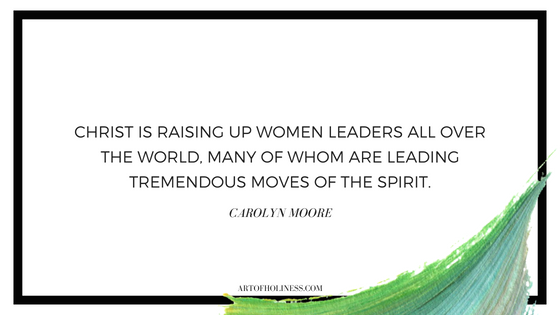Women lead, and women pastor. To a much lesser extent, women also plant churches, but I believe God is calling the global Church in the 21st century to take note of the potential present in women gifted and called to do a new thing. I say this not because I’m an activist for women but because I’m passionate about the Kingdom of God. By giving planters and leaders alike relevant information and tools, we can reframe the planting experience as it relates to women and release untold potential. We can also create positive, life-giving opportunities for women called to plant new works, and raise up a generation of excellent role models who inspire still other potential planters. By leaning in and caring actively for the role of women in church planting, we prove ourselves Wesleyan. We collectively determine that we will not be so pragmatic in our pursuit of church development that we leave women behind, effectively cutting ourselves off at the knees.
To make room for women at the church-planting table, we must be honest about what I call natural barriers facing women church planters (barriers faced by all women, regardless of giftedness or potential), addressing them with a generous spirit, rejecting both naiveté and defensiveness so we can help gifted and called women to lead successfully past those barriers.
How do we help women lead past the natural barriers so they can successfully plant churches and contribute in this way to the coming Kingdom? I have discerned at least four barriers in my own experience as a planter, which I believe we must honestly acknowledge and negotiate:
Leadership as a theological issue. Because 50% of Christians (statistically speaking) don’t hold our theological position on women as leaders of churches, the pool of potential church members is smaller for us from the outset. The pool of potential leaders is smaller, too. This is a unique dynamic for planters, because we are attracting people who don’t already have an emotional attachment to our church. They don’t have a history with this church that holds them in place while they acclimate to female leadership. There are people I will never meet simply because I am a woman pastor with whom they disagree theologically.
Leadership as a cultural issue. Whether we acknowledge it or not, we all have leadership biases. Most of them live in some foggy place in the back of our minds as a vague, unverbalized feeling. We want our leaders to look and act in ways that are familiar to us. We may not have reasoned through these feelings, but they are there and some of those biases have to do with the place of women in leadership. I believe, in fact, that this cultural bias is a global issue, even an issue of human fallenness and our discomforts (even subconscious discomforts) must be acknowledged honestly. How do we want women in leadership positions to act? How do we want mothers in leadership positions to act? Are we willing to allow for differences or will we cling to unspoken biases?
Leadership as a resource issue. Resources to equip women church planters are still very much in the developmental stage. Training opportunities are often geared toward a male audience. Women may find few mentors and coaches equipped to help negotiate the cultural biases influencing the communities within which we serve. In fact, we may identify few if any role models in our local context. Faced with these and other more typical lifestyle pressures, women church planters are challenged to succeed in an area of ministry that is difficult for even the best trained among pastors. Resources for church planting in general are limited, causing boards and agencies to make gender-biased choices. A clergywoman reports being told by a denominational official, “There is little evidence supporting the idea that women can successfully plant churches, so we’re not willing to put any resources into it.” That’s a mindset that must change.
Leadership as a denominational issue. For all the above reasons, I maintain that growth for a female-pastored church plant may be different than growth for a male-pastored church plant. This isn’t an issue of failure but pace. Much of the conversation in the church-planting world these days focuses on rapid growth, but women may not be able to meet that standard. Benchmarks should be carefully, sensitively calibrated so success has a chance to happen because as we’ve already said, we’re drawing from a smaller pool and pushing against culture.
We are challenged to hear Jesus as he tells Mary, “Go and tell the others,” and to trust that he is speaking that word to women still today. In fact, he is. He is raising up women leaders all over the world, many of whom are being equipped to plant churches, many of whom are leading tremendous moves of the Spirit.
In order for us to be most useful to a new generation of planters, we must be eyes-wide-open and honest about these barriers to growth in churches planted by women, even as we think soberly about ways to maneuver past them.








